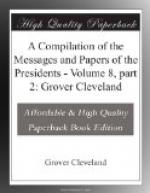But it is dreaded that the freed people will swarm forth and cover the whole land. Are they not already in the land? Will liberation make them any more numerous? Equally distributed among the whites of the whole country; and there would be but one colored to seven whites. Could the one in any way greatly disturb the seven? There are many communities now having more than one free colored person to seven whites and this without any apparent consciousness of evil from it. The District of Columbia and the States of Maryland and Delaware are all in this condition. The District has more than one free colored to six whites, and yet in its frequent petitions to Congress I believe it has never presented the presence of free colored persons as one of its grievances. But why should emancipation South send the free people North? People of any color seldom run unless there be something to run from. Heretofore colored people to some extent have fled North from bondage, and now, perhaps, from both bondage and destitution. But if gradual emancipation and deportation be adopted, they will have neither to flee from. Their old masters will give them wages at least until new laborers can be procured, and the freedmen in turn will gladly give their labor for the wages till new homes can be found for them in congenial climes and with people of their own blood and race. This proposition can be trusted on the mutual interests involved. And in any event, can not the North decide for itself whether to receive them?
Again, as practice proves more than theory in any case, has there been any irruption of colored people northward because of the abolishment of slavery in this District last spring?
What I have said of the proportion of free colored persons to the whites in the District is from the census of 1860, having no reference to persons called contrabands nor to those made free by the act of Congress abolishing slavery here.
The plan consisting of these articles is recommended, not but that a restoration of the national authority would be accepted without its adoption.
Nor will the war nor proceedings under the proclamation of September 22, 1862, be stayed because of the recommendation of this plan. Its timely adoption, I doubt not, would bring restoration, and thereby stay both.
And notwithstanding this plan, the recommendation that Congress provide by law for compensating any State which may adopt emancipation before this plan shall have been acted upon is hereby earnestly renewed. Such would be only an advance part of the plan, and the same arguments apply to both.
This plan is recommended as a means, not in exclusion of, but additional to, all others for restoring and preserving the national authority throughout the Union. The subject is presented exclusively in its economical aspect. The plan would, I am confident, secure peace more speedily and maintain it more permanently than can be done by force alone, while all it would cost, considering amounts and manner of payment and times of payment, would be easier paid than will be the additional cost of the war if we rely solely upon force. It is much, very much, that it would cost no blood at all.




